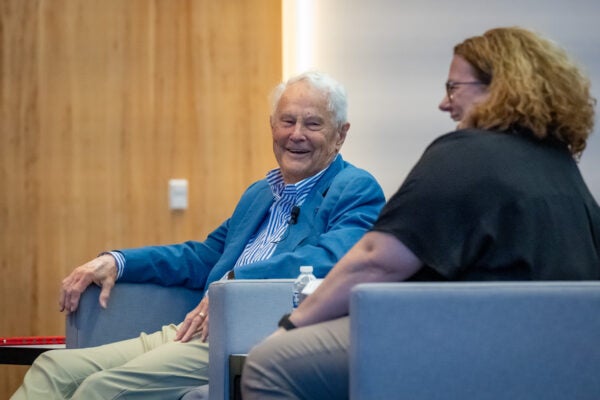AI With a Human Touch
New Executive Education course will help managers navigate artificial intelligence in the workplace

Geoscientist Sean Avitt is excited about using artificial intelligence at the Texas Railroad Commission to help inform decisions on injection well permits, especially in earthquake-prone areas. But he also is clear-eyed. New technology can be challenging to employees, as well as decision-makers.
Avitt says he is eager to learn more from a new Texas Executive Education program at the McCombs School of Business about navigating AI and coping with human emotions in the workplace. That’s the aim of a two-day course titled AI + EQ: A New Era of Leadership Strategies. The program’s goal is to equip executives with a deeper understanding of what artificial intelligence can — and can’t — do while arming them with strategies to enhance their emotional intelligence. Texas Executive Education leaders think that this is the first program of its kind at a U.S. university to combine both human and technology components.
Emotional intelligence, also called emotional quotient (EQ), is the ability to use one’s emotions — and to understand the emotions of others — to relieve stress, communicate effectively, empathize with others, and overcome challenges.
“So far, our efforts on AI have been dipping our toes in,” Avitt says. “It had not occurred to me as much to consider the rest of our staffs’ interactions with AI — understanding their concerns and knowing how best to address them while leveraging these tools.”
Equipping individuals with the mindset, skill set, and tool set to navigate the emergence of AI in the workplace is the purpose of the course, which is being taught this fall.
The course will be led by AI expert Zena Drakou, director of undergraduate business analytics at McCombs and a lecturer in the school’s Information, Risk, and Operations Management Department; and Katie Pritchett, an award-winning educator and CEO of KPI Coaching LLC, who brings expertise in EQ.
The instructors say they detect a hunger for what they’re teaching as AI sweeps across industries like a viral meme. Enrollment is now open for the in-person, campus-based program scheduled for Oct. 28–29. Pritchett says plans call for offering it again during the spring at a date to be determined.
“I’ve been in consulting for the last 2½ years, working across several Fortune 500 companies, and know firsthand from those projects that this is on the top of every executive’s mind,” Pritchett says. “They’re equally inspired and frightened by the emergence of the technology and how it will disrupt and/or enhance their mission and work.”
AI technologies and the pace at which they are evolving are revolutionary, Pritchett and Drakou say, making it critical for executives to develop more human-centric skills and strategies. “Our ability to collect and understand more and more data is changing how we will learn, grow, and relate to the world in an exponential way,” Pritchett says.
The program will feature hands-on activities and demonstrations on technologies, EQ-driven leadership skills, and forward-thinking strategies. Plans include a live panel of experts to discuss how they use AI in their companies.
“With any revolution, there will be new skills to develop and opportunities,” Drakou says. “They need to be able to manage and figure out: How do I make AI my ally and not my enemy? … We need to have ethical considerations and avoid bias, while relying on EQ for context and human judgment.”
Drakou says she will help program participants understand better how AI works, learns, and adapts over time so they and their organizations can benefit from using it. “Sometimes, we don’t know what AI knows,” she says. “We need to learn not to be intimidated, learn that it makes mistakes, and learn that it’s not God.”
Author Nancy Giordano, a global public speaker and strategic futurist who is collaborating with the teaching team, says she has consulted with many corporations and has found a tendency to get stuck in old ways of thinking and behaving. Prioritizing efficiency and excellence doesn’t encourage curiosity or give employees a safe space to develop audacious, innovative solutions — or to fail, she says.
Changing one’s mindset doesn’t have to be an onerous process. “Sometimes, it’s a really small change,” Giordano says, such as “being more collaborative and less competitive.”
“If we continue to use these old ways of thinking with AI, then the future becomes more dire,” she says. “People who are scared of the future are operating from this outdated playbook, and the people who are excited about the future are operating innovatively.”
Innovators, Giordano adds, need to ask: “What does it mean to be a curious organization? How are you incentivizing curiosity?”
Gaylen Paulson, McCombs associate dean and executive director of Texas Executive Education, agrees with the importance of capitalizing on curiosity. He says that even though AI is a hot topic, it is not well understood. “This innovative program provides not just a better understanding of the technologies but also considers human-centric strategies for upskilling and implementation.”
Pritchett says that with the hands-on approach to the class, she expects that participants will “return to their organizations as an ‘AI ambassador,’ to play an important role in guiding the organization with a leadership approach that is innovative, empathetic, adaptive, and forward-thinking.”
Those interested in the course, which costs $3,350, can find out more and register at www.mccombs.utexas.edu/execed/for-individuals/classes/leadership-and-management/ai-eq-new-era-leadership-strategies/.
About this Post
Share:


